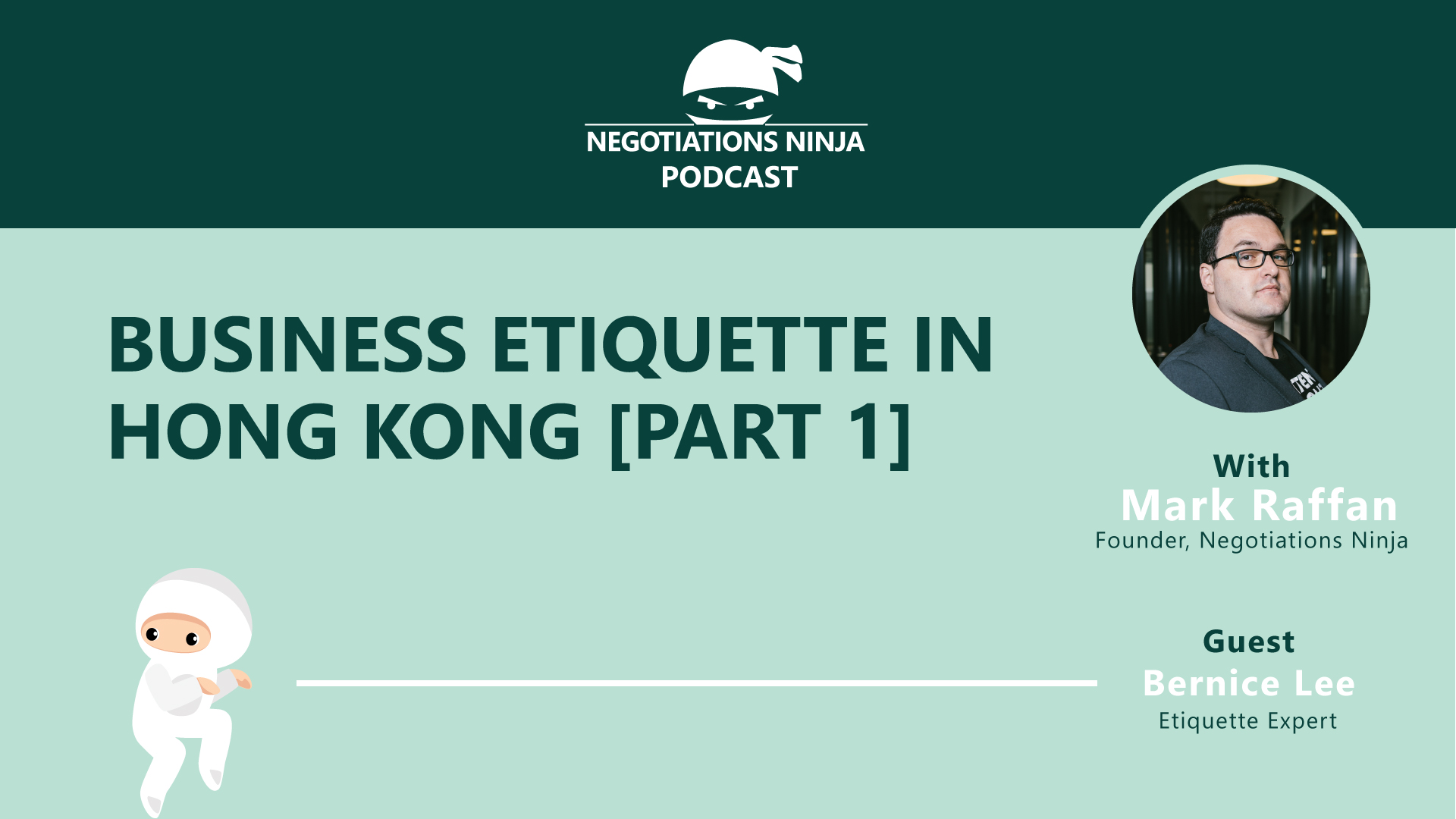The wonderful Bernice Lee joins us today for a fascinating conversation about etiquette in Hong Kong. With so many of us traveling to Hong Kong and mainland China for business, understanding the cultural norms and business etiquette of the local area is critical. Bernice shares what to do and what NOT to do.
She helps decipher what conversations are appropriate at the dinner table, what proper greetings are, and the rules around socializing in and out of formal business meetings. Bernice is a graduate of Yale and Cornell who has lived and worked in the United States, Canada, Hong Kong, and mainland China. She knows what she’s talking about. This is need-to-know information for international negotiators.
Outline of This Episode
- [3:01] Bernice’s background in business etiquette
- [4:14] How Hong Kong differs from mainland China
- [6:20] The proper way to greet someone in Hong Kong
- [10:46] The concept of saving face in Hong Kong
- [13:19] The importance of body language in interactions
- [16:34] The concept of personal space in conversation
- [22:54] When do you broach business conversation?
- [24:00] What is the drinking culture in Hong Kong?
- [28:20] How to properly thank your hosts
- [32:07] Be genuine, curious, and respectful
- [33:34] How to connect with Bernice
Comparing and contrasting Hong Kong and mainland China
Bernice notes that anyone from North America typically finds Hong Kong to be an easy transition. Because it was originally a British Colony, there are some common Western practices mixed with Chinese culture. Mainland China might feel different, especially once you travel deeper into the mainland.
But from Hong Kong to the innermost cities, there is an emphasis on respect for authority and a hierarchical system. There is a large focus on the concept of face. Bernice encourages you to be genuine, listen actively, and show a curiosity for their culture. It’s important to show courtesy and respect.
The proper way to greet someone in Hong Kong
Most people in Hong Kong will likely use English with you. If you want to use Cantonese, you can simply learn to say “hello.” A handshake will feel lighter and softer than what North American’s are used to. There’s less of an awareness of the “firm two-pump business handshake.” People may hang on to your hand. It’s like a dance—so go along with it if that’s the handshake that you get. But Bernice notes that If you’re working with a counterpart who is accustomed to doing business internationally, a handshake will seem more natural. They may give a slight bow of the head.
If they are a homegrown Hong Kong businessman, they may be reluctant to shake hands for a few different reasons. Culturally, they aren’t used to a lot of physical contact. They aren’t big into hugging, kissing, or public displays of affection. Secondly, SARS hit Hong Kong quite hard and it scared people. People were very concerned about hygiene, sanitation, and not catching germs. That has remained pervasive in the culture.
What is the concept of saving face? Why is it SO important to be mindful of? Do Chinese businessmen say “no”? Listen to learn more!
The importance of body language in interactions
In North America, body language and holding eye contact is incredibly important. Bernice believes that how we present ourselves still makes a large portion of how someone perceives your credibility—but it might translate differently across cultures. In general, she recommends that you stand up straight with good posture. Keeping steady eye contact is also acceptable.
North Americans may be surprised to know that people from Hong Kong don’t smile at people that they’ve just met. In North America, smiling is a way to communicate amiability, friendliness and openness. But in Hong Kong, people may be taken aback. They may wonder if you want something from them or think you’re making fun of them. So keep your smiling at a minimum. Is the concept of personal space the same? Listen to find out!
Appropriate dinner conversation + etiquette
Bernice shares that in a formal business situation, typically the older or more senior people are seated first. Observe what people are doing and follow suit. Someone from the host’s party will seat you in the appropriate spot.
In terms of enjoying food, the place setting will be quite simple. You’ll have the rice bowl, a plate, a teacup, perhaps a sauce dish, a chopstick rest, and chopsticks. Fancier places may have two pairs of chopsticks—one pair of chopsticks is used to pick up food from shared dishes to place on your plate. The other pair is for your own use to eat.
As far as dinner conversation goes, Bernice says to stay away from anything political, and anything Taiwan or Tibet related. She also recommends staying away from religion, off-colored jokes, anything sex-related, etc. She finds that Chinese people do engage in small talk, but it’s different from the UK or North America. In Hong Kong, they might ask “Have you eaten?” instead of “How are you doing?” They may ask about your family. It is perceived as being personable and caring about you as a human being versus nosy.
When should you broach business conversation during dinner? How do you navigate a drink with a business associate? What gifts should you avoid giving as a thank you? Listen to the whole episode for Bernice’s opinions and advice.
Resources & People Mentioned
Connect with Bernice Lee
- The Etiquette and Leadership Institute
- Connect on LinkedIn
- Follow on Facebook
Connect With Mark
- Follow Negotiations Ninja on Twitter: @NegotiationPod
- Connect with Mark on LinkedIn
- Follow Negotiations Ninja on LinkedIn
- Connect on Instagram: @NegotiationPod




